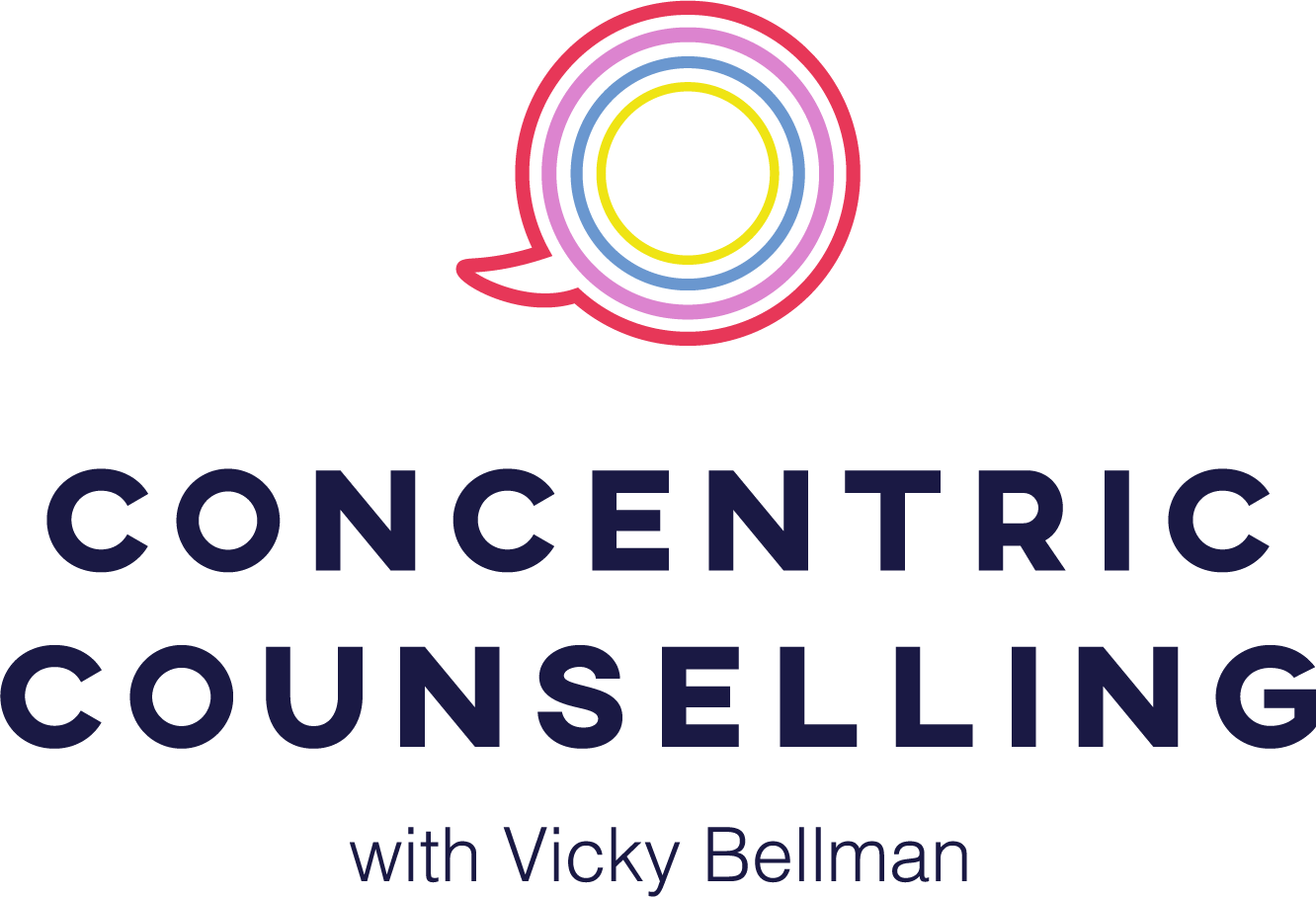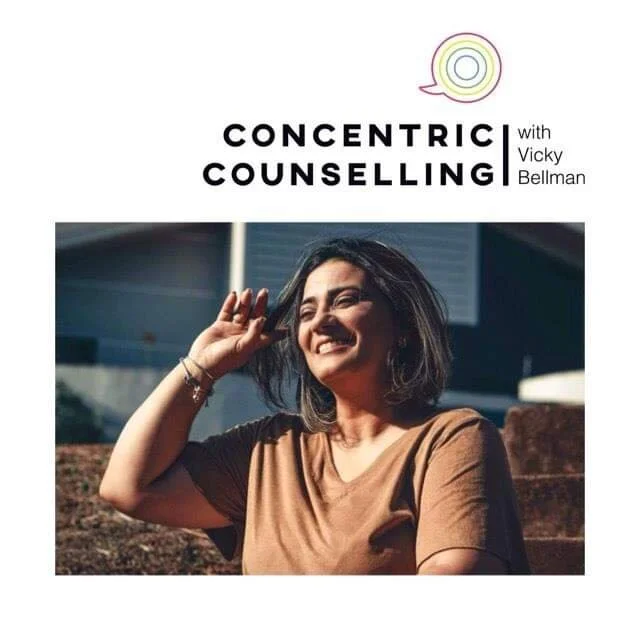welcome to the concentric journal
When people come to Concentric Counselling with a history of bingeing, they are often surprised that one of the first things I ask them is how often they restrict their food intake. To them, they are coming because the issue is bingeing. But what continues to reveal itself in the therapy room is that for many people that struggle with bingeing these episodes punctuate long periods of restriction.
Read MoreLet me share with you some more details of the exciting model that I’ve been developing. Called Body Collaboration, it has emerged from my practice over the last ten years, a compassionate response to clients sharing a persistent issue - ‘I’m trying to hate myself into being ok with myself’. Body Collaboration is a pushback to a kyriarchal culture that teaches us to admonish ourselves rather than accept ourselves. It’s a radical practice of gathering in the most abandoned parts of ourselves, and offering them healing. And it’s a lovesong to what I think is the most powerful thing on Earth – partnership, collaboration, working together for the good of the all.
Read MoreI often meet clients when they're in a particular spot... they’ve turned their back on intentional weight loss, knowing that going back into that way of life will only cause harm and open them up to risk. At the same time, they don't know how to transition into a space of body acceptance, knowing that there will also be loss in that decision.
Read MoreIn my corner of the world, we talk a lot about anti-fat bias or fatphobia and, more broadly, how it is to live in a body that is marginalised by dominant culture – through race, gender and sex, body size or shape, or disability.
Sometimes our conversations about anti-fat bias can take on a very theoretical and abstract form – as a systemic issue, of course we often look at it through a wide-angle lens. More recently, though, I’ve been thinking more and more of the individual impact of anti-fat bias – what it really means to live in a fatphobic culture.
Read MoreOverwhelm and burnout don’t just happen in Covid times – these are themes I’ve been working for since the very beginning of my counselling career. It’s when our nervous system becomes overloaded, and we really struggle to regulate ourselves; feeling either anxious and agitated, or zoned out and flat.
Read MoreFor those of you who follow me on Instagram or subscribe to my mailing list you will know that I have been building towards a space for therapists to come together and connect. I’m so happy today to be able to outline this a little more, and introduce this idea to you.
Read MoreWe're in an ebb season, collectively, I think. And we're not encouraged to think about this at all. The effects of the pandemic, here in the UK, have been upon us for eleven months. And what’s been so surprising is how little accommodation we will often make for this. We’re living in a global tragedy – a collective trauma. Life has, necessarily, had to recede. We have had to lean hard on our internal resources – our patience, our hope, our tenacity. Understandably, we’re feeling a little depleted.
Read MoreThe relentless treadmill of diet resolutions is about to crank itself up again, at the start of the new year. After all the festive food adverts, Boxing Day onwards will see the focus shift instead to weight loss programmes, diet foods and new ‘healthy eating’ cookbooks, sold to you by slim people. It is a predictable, exhausting cycle, which perpetuates unhealthy ‘all or nothing’ thinking, and punishing and unsustainable restriction.
Read MoreAnd so begins December, the month where dominant culture tends to deep-slide into a clarion call for ‘indulgence’ before, as regular as clockwork, the adverts and articles that promise ‘new year, new you’. Christmas is an exaggerated example of the pendulum swing that diet culture encourages; ricocheting between too much and not enough – all governed by a deep fear that we ourselves are not enough.
Read MoreToday is the International Day for the Elimination of Violence Against Women. It is a day, each year, that I feel reassured that incorporating a feminist approach into my work is both necessary and useful. And this year I thought it would be good to share that process with you – to share some of my thoughts on feminist approaches in therapy, as both an insight into the way in which I work, and also as a contribution to the work itself.
Read Morehere’s what I notice... so many people are having a hard time, and then giving themselves a hard time, if they are performing at less than maximum competency. I’ve seen very little collective or individual comfort allowance from or for people in these extraordinary circumstances – rather than considering the context of our current circumstances and opening up our margin of comfort a little bit, we seem to be expecting ‘business as usual’ from ourselves…
Read More…have been sold the idea, and bought it, that a diet represents the magic key that will unlock all their potential - a fulfilling job, a satisfying relationship, an active social life, a life enjoying exercise, dancing around on sun-drenched jetties in a red dress.
Read MoreIn an experience of disordered eating or eating disorders, food gets reduced to the bare minumum of what it represents - energy units. Counting and controlling, we forget all the other reasons why we eat. Recovery restores to us all the potential of food - all its wonderful satisfaction and nourishment - yes, physically, but also mentally, emotionally and spiritually.
Read MoreIn a constant state of food obsession, your interactions with others can be affected - feeling more tense, strained and full of friction. When energy intake is restricted and controlled, our relationships can be tested - scarcity creates irritability and snappiness. As the eating disorder attempts to distort and disconnect you from your own body, your relationships can feel distorted and lack connection as well.
Read MoreWhen I meet people struggling with a disordered relationship with food, whether or not they think are ‘sick enough’ to consider they have an eating disorder, one unifying issue is just how much time they have to devote to their relationship with food. Food obsession and intrusive, persistent thoughts can take up hours, days and months of life, until it becomes hard to focus on anything else…
Read MoreYesterday, I wrote about how recovery can help restore our sense of self, and today I want to talk about how recovery can restore… core wisdom…
Read MoreWhen I spend time with clients, we are all to familiar with what they have lost to their experience, and grieving is such a necessary part of the process of recovery. Often, it can feel like the process will never end, and it’s difficult to keep sight of what is gained through the process of recovery.
So, this week I want to mark it down in writing - a few common aspects that disordered eating and eating disorders take away, and recovery restores…
Read MoreWhether the feeling of stuckness has been brought about through stress, loss, heightened anxiety or low mood, the central factor is that we become dysregulated; our system can feel flooded. As one young woman said in my practice room recently, ‘I’m just over it’. And we need to administer an antidote.
Read MoreLet’s extract health from weight focus, and look at some real things that parents can do to support their child in navigating our diet focused culture, and develop a healthy relationship with food and body.
Read More




















